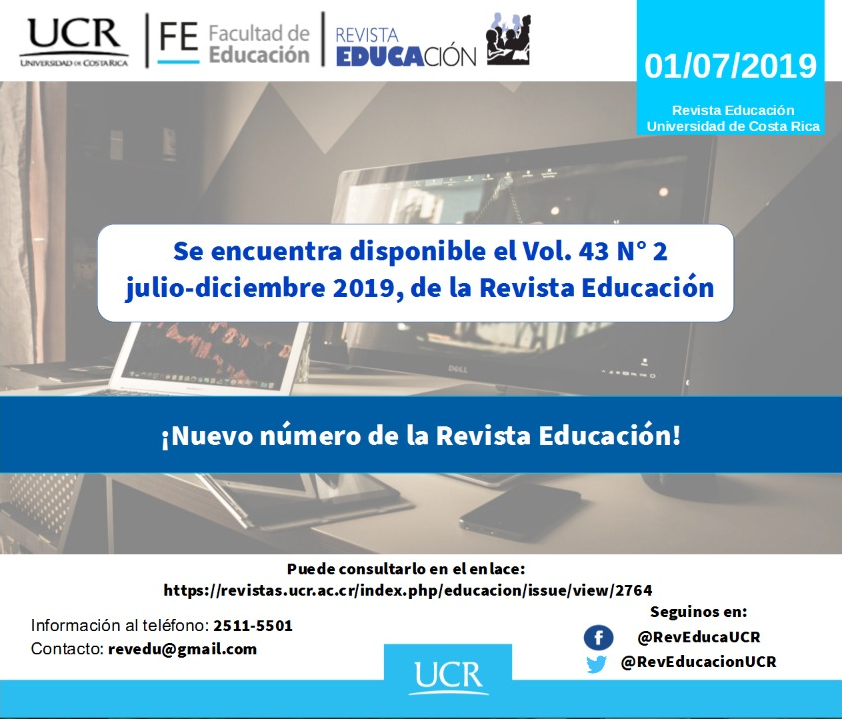Abstract
The article addresses the importance of cognitive mediation conducted by teachers as an essential resource for developing student autonomy, metacognition and self-regulated learning in order to improve regulation of learning strategies and foster new approaches to learning. Practices and experiences of Mediated Learning enhance differentiated instruction where teachers and students actively co-operate and all students work consistently on challenging activities. The point of departure is a socio-constructivist pedagogy paradigm designed to improve student learning. It also recognizes students as central actors of their own intellectual development. The theoretical basis of the article builds on the analysis of relevant theoretical constructs for teaching and learning.
References
Abrami, P., Bernard, R., Borokhovski, E., Waddington, D., Wade, A. y Persson, T. (2015). Strategies for teaching students to think critically: A meta-analysis. Review of Educational Research, 85(2), 275-314. doi: 10.3102/0034654314551063.
Ainscow, M. (1995). The next step for Special Education: supporting the development of inclusive practices. British Journal of Special Education, 27 (2), 76-80.
Ausubel, D. (1978). In defense of advance organizers: A reply to the critics. Review of Educational Research, 48, 251-257.
Brookfield, S. (2012). Teaching for Critical Thinking: Tools and Techniques to Help Students Question Their Assumptions. San Francisco, EEUU: Jossey-Bass.
Dabbagh, N. y Kitsantas, A. (2011). Personalized Learning Environments, social media, and self-regulated learning: A natural formula for connecting formal and informal learning. Internet and Higher Education 15, 3-8. doi.org/10.1016/j.iheduc.2011.06.002.
Dodge, J. (2005). Differentiation in Action. New York, NY: Scholastic.
Efklides, A. (2011). Interactions of Metacognition with Motivation and effect in Self-Regulated learning: The MASRL Model, Educational Psychologist, 46 (1): 6-25. doi: 10.1080/00461520.2011.538645.
Entwistle, N. (1990). Teaching and the quality of learning in higher education. En N. Entwistle (Ed.), Handbook of Educational Ideas and Practices (pp. 669-680). London: Routledge.
Entwistle, N. y Ramsden, P. (1983). Understanding Student Learning. London: Croom Helm.
Ferreira, M. (2006). Pedagogia Mediatizada: um desafio para o professor e para o aluno. Alameda - Revista de Educação, Artes e Ciências, 2, 36-39.
Ferreira, M. (2009). Estratégias de intervenção pedagógica em alunos com dificuldades de aprendizagem específicas. Revista de Educação Especial e Reabilitação, 4 (16), 7-18.
Ferreira, M. (2013). Tutorial Teaching: A New Paradigm for the Development of Competencies, Journal of Educational, Cultural and Psychological Studies (ECPS), 8, 205-219. doi: 10.7358/ecps-2013-008-ferr.
Ferreira, M. (2017). Guia para uma pedagogia diferenciada em contexto de sala de aula – Teoria, práticas e desafios. Coleção de Guias Educacionais. Lisboa: Coisas de Ler.
Feuerstein, R. (1980). Instrumental Enrichment. Baltimore: University Park Press.
Fonseca, V. (2001). Cognição e Aprendizagem. Lisboa: Âncora Editora.
Gaskins, I. y Thorne, E. (1999). Cómo enseñar estrategias cognitivas en la escuela. El manual benchmark para docentes. Barcelona: Paidós.
Gregory, G. y Chapman, C. (2002). Differentiated Instructional Strategies: One Size Doesn’t Fit All. Thousand Oaks, CA: Corwin Press, Inc.
Grolnick, W. y Ryan, R. (1989). Parent styles associated with children's self-regulation and competence in school. Journal of Educational Psychology, 81,143-154. doi: dx.doi.org/10.1037/0022-0663.81.2.143.
Haywood, C. (1995). Cognitive early education. Massachussets: Charlsbridge Publishers.
Johnson, R. T. y Johnson, D. W. (2008). Active learning: Cooperation in the classroom. The Annual Report of Educational Psychology in Japan, 47, 29-30. doi: org/10.5926/arepj1962.47.0_29.
Kolb, D. A. (1984). Experiential Learning Experience as the Source of Learning and Development. Englewood Cliffs. NJ: Prentice Hall.
Marin, L. y Halpern, D. (2011). Pedagogy for developing critical thinking in adolescents: Explicit instruction produces greatest gains. Thinking Skills and Creativity, 6(1), 1-3. doi: 10.1016/j.tsc.2010.08.002.
Marton, F., Dall’Alba, G. y Beaty, L. (1993). Conceptions of learning. International Journal of Educational Research, 18, 227-300.
Matusov, E. y Marjanovic-Shane, A. (2017). Promoting students’ ownership of their own education through critical dialogue and democratic self-governance. Dialogic Pedagogy: An International Online Journal, 5(1), 1-29. doi: 10.5195/dpj.2017.199.
Olsen, G. y Fuller, M. L. (2008). Home-School Relations: Working Successfully with Parents and Families. New York: Allyn Bacon.
Robbins, J. (2005). Contexts, Collaboration, and Cultural Tools: A sociocultural perspective on researching children’s thinking. Contemporary Issues in EarlyChildhood, 6 (2), 140-149. doi.org/10.2304/ciec.2005.6.2.4.
Schraw, G. (2010). Measuring self-regulation in computer-based learning environments, Educational Psychologist, 45 (4), 258-266. doi: 10.1080/00461520.2010.515936.
Schraw, G., Crippen, K. J. y Hartley, K. D. (2006). Promoting self-regulation in science education: Metacognition as part of a broader perspective on learning. Research in Science Education, 36 (1-2), 111-139. doi: 10.1007/s11165-005-3917-8.
Segal, J., Chipman, S. y Glaser, R. (1985). Thinking and Learning Skills. Hillsdale: LEA.
Sibbett, L. (2016). Toward a Transformative Criticality for Democratic Citizenship Education. Democracy & Education, 24(2), 1-11.
Silva, A. (2004). A auto-regulação na aprendizagem. En A. L. Silva, A. M. Duarte, I. Sá y A. V. Simão (Eds.), Aprendizagem auto-regulada pelo estudante: Perspectivas psicológicas e educacionais (pp. 17-39). Porto: Porto Editora.
Simão, A. (2004). O conhecimento estratégico e a auto-regulação da aprendizagem – implicações em contexto escolar. En A. L. Silva, A. M. Duarte, I. Sá y A. V. Simão, Aprendizagem auto-regulada pelo estudante: Perspectivas psicológicas e educacionais (pp. 77-94). Porto: Porto Editora.
Sternberg, R. (2002). Estilos de Pensamento. Lisboa: Replicação.
Stoll, L. (2009). Capacity building for school improvement or creating capacity for learning? A changing landscape. Journal of Educational Change, 10(2-3), 115-127. doi: 10.1007/s10833-009-9104.
Tomasello, M. (1999). The Cultural Origins of Human Cognition. Cambridge: Harvard University Press.
Vygotsky, L. (1978). Mind and Society: the development of higher psychological processes. Cambridge: Harvard University Press.
White, B. y Frederiksen, J. (1998). Inquiry, modeling and metacognition: Making science accessible to all students. Cognition and instruction, 16(1), 3-118. doi: 10.1207/s1532690xci1601_2
Zimmerman, B. (2000). Attaining self-regulation: A social cognitive perspective. En M. Boekaerts, P. Pintrich y M. Zeidner (Eds.), Handbook of Self-Regulation (pp. 13-29). New York: Academic Press. doi: dx.doi.org/10.1016/B978-012109890-2/50031-7
Zimmerman, B. (2001). Theories of self-regulated learning and academic achievement: An overview and analysis. En B.J. Zimmerman y D.H. Shunk, (Eds.), Self-regulated learning and academic achievement: Theoretical perspectives (pp. 1-37). Mahway, NJ: Lawrence Erlbaum
Zimmerman, B. J. (2008). Investigating self-regulation and motivation: Historical background, methodological developments, and future prospects. American Educational Research Journal, 45 (1), 166-183. doi: doi.org/10.3102/0002831207312909







